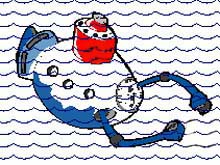
Lesson plans are available for this expedition. Download them from this page, just visit the link to the left.
Education
The Hudson Canyon Cruise has several educational and outreach thrusts. Among them are Lesson plans and a Port Call event.
Lesson Plans
Read a description of each lesson plan and/or download them to your computer.
With the establishment of the Ocean Exploration Program within the National Oceanic and Atmospheric Administration (NOAA), we have a great opportunity reach out in new ways to teachers, students, and the general public and share the excitement of daily discoveries while at sea and the science behind the exploration initiatives sponsored by NOAA. The Hudson Canyon Cruise will advance our knowledge of the seafloor thru mapping and methane venting zones in the areas to the east and west of the Hudson Canyon. As such, this Expedition has great potential for generating exciting outreach and education opportunities as part of NOAA’s Ocean Exploration Program education efforts.
During the Hudson Canyon Cruise, scientists have two objectives: 1) to map areas of the continental slope and rise to the east and west of Hudson Canyon, and merge this data with existing multibeam coverage of the Hudson Canyon to produce the first coherent high-resolution bathymetric map of the Hudson canyon region; and 2) to target methane-venting zones in the Hudson canyon region using a CTD-rosette system to profile the water column and recover water samples for in-depth chemical analysis.
Educators and scientists working with NOAA during June and July 2002 developed a series of lesson plans for students in Grades 5 – 12 that are specifically tied to the Hudson Canyon Cruise. These lesson plans focus on cutting-edge ocean exploration and research, using state-of-the-art technology, aboard one of the nations flagship research vessels, the NOAA Ship Ron Brown. The lesson plans focus specifically on the importance of ocean exploration and the research taking place during the Hudson Canyon Cruise, and feature such topics as sediment sampling and ocean pollution, the diversity and predominance of red deep sea organisms, adaptations of fishes living in the mesopelagic and bathypelagic zones of the deep ocean, sediment transport in an underwater canyon, Hudson Canyon bathymetry and sediments, and gas hydrates.
The lesson plans are grouped into the following categories:
Grades 5-6
Grades 7-8
Grades 9-12 (chemical, biological, earth, and physical science).
Each grade-level grouping includes activities that focus on the exploration and research being conducted as part of the Hudson Canyon Cruise. In addition to being tied to the National Science Education Standards, the hands-on, inquiry-based activities include focus questions, background information for teachers, links to interesting Internet sites, and extensions. Web logs that document the latest discoveries and complement the lesson plans, complete with compelling images and video, will be sent nearly every day from sea. Teachers are encouraged to use the daily logs from the Hudson Canyon Cruise, which are posted on this site, to supplement the lesson plans.
Port Call Event
A series of public events are scheduled for Tuesday, September 17th to celebrate the arrival of the NOAA research vessel Ronald H. Brown at the Intrepid Air and Space Museum in New York City. The ship will be arriving in New York following a two-and-a-half week cruise to map the bottom of the Hudson Canyon. The day will begin with a VIP breakfast for members of government, industry and academia, followed by a tour and briefing for local and regional media. The highlight of the day will be the arrival of groups of students from approximately 20 schools surrounding the New York/New Jersey Harbor region. These students will have used the Internet to monitor the progress of the cruise and interact with cruise scientists during the course of the expedition. Each student group will be given a 45-minute tour of the ship, led by several of the ship’s officers. The tours will allow the students to experience first hand what it is like to work aboard a floating ocean laboratory, and to learn in greater detail about the equipment used and data collected during the cruise.
Sign up for the Ocean Explorer E-mail Update List.























